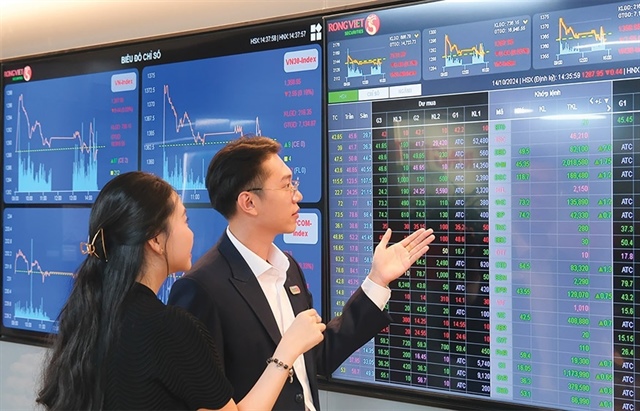|
Securities law paves way for upgrade
Additional provisions in the amended Securities Law are expected to enhance the responsibility of market participants and supervision capabilities, helping to address numerous legal barriers with the goal of upgrading the stock market.
On November 29, during the eighth session of the National Assembly, deputies voted to approve amendments to the Securities Law. A highlight of the revision is the establishment of a legal system for clearing and settlement of securities transactions on the market through a central counterparty model, a cornerstone for aligning Vietnam’s stock market with international standards.

Vietnam is getting closer to its goal of adhering to higher market standards, photo Le Toan
|
Market upgrading has long been a strategic goal of Vietnam’s securities sector and is expected to provide a significant boost for the stock market to thrive in a new era.
“The approval of the amended Securities Law at this time will be an important stepping stone, creating a favourable framework to strengthen foreign investor confidence. The new law aims not only to enhance market transparency but also to address the issue of fictitious capital increase issuance, which has been one of the persistent problems in Vietnam’s stock market in recent times,” said Phan Linh, CEO of investment consultants Techprofit.
“This is also a stepping stone for Vietnam to realise its market upgrade goal according to FTSE’s criteria. In my personal assessment, Vietnam could achieve secondary market status by September 2025.”
The amended law has introduced provisions on the participation of professional securities investors. Specifically, only investors with experience and sufficient financial capability are allowed to trade and transfer individual corporate bonds in certain cases. This includes bonds with high credit ratings and collateral or payment guarantees from credit institutions.
Experts consider this a practical step to protect investor interests and maintain stability in the bond market, which is an essential capital-raising channel for businesses.
Additionally, the amended law emphasises strengthening transparency and the effectiveness of market supervision. Fraudulent and deceptive practices in the issuance and offering of securities will be more strictly addressed, creating a fair and transparent competitive environment.
“This not only meets investor expectations but also contributes to enhancing the attractiveness of the Vietnamese market according to international organisations,” Linh added. “In the long term, a clear legal framework will help create a healthy, growing market. However, these changes are likely to create short-term challenges. Stricter regulations may limit investor capital flows and make it more difficult for some companies to raise capital.”
Do Bao Ngoc, deputy CEO of CSI Vietnam Construction Securities, emphasised that the significant changes introduced promise to create a more transparent landscape for Vietnam’s stock market.
“The approval is a valuable addition in many aspects. This is not only a strategic legal adjustment, but also a lever to help Vietnam move closer to its goal of upgrading the market to the emerging market group of international organisations such as FTSE and MSCI,” Ngoc said.
In addition to the key highlights of the amendment, many new provisions have been added regarding market manipulation, which negatively affects stock price movements.
“Another noteworthy step is allowing independent clearing houses, paving the way for the central counterparty mechanism, which reduces systemic risks and boosts market professionalism. This is crucial for FTSE and MSCI to recognise improvements and support market upgrades,” said Ngoc.
However, Ngoc warned that recent short-term market developments have been influenced by many factors, including cash flows, investor sentiment through fluctuations in factors such as the exchange rate, interest rates, monetary policy, and the volatility of investment channels such as real estate and gold.
“These sensitive issues in the year-end period have kept the stock market’s liquidity low, with stock indices experiencing short-term sideways down trends,” Ngoc added.
Nguyen The Minh, head of Research and Development for Retail Clients at Yuanta Securities Vietnam, assessed that the attractiveness of Vietnam’s stock market is no longer what it once was.
“It is facing a shortage of quality assets, particularly with the stagnation in initial public offering deals and the equitisation of state-owned enterprises. However, with the passage of the Public Asset Management Law, it is expected that starting from 2025, these deals will open up new supply, helping to fill the market’s gap,” Minh said.
This not only helps attract capital flows back, but also plays a crucial role in the market upgrade process, Minh added. “Listing and equitisation will help Vietnam overcome the capitalisation challenges and ensure its ability to stay ranked, rather than risk being downgraded due to size limitations,” said Minh.
As Vietnam moves towards a new era of development, he pointed out three factors that the stock market needs to improve to draw in foreign indirect investors again.
“Firstly, the technical mechanisms for market trading, particularly the registration and account opening process for foreign investors. Currently, the requirement for approval from the Vietnam Securities Depository and Clearing Corporation to open new accounts for foreign investors is relatively complicated compared to other countries,” Minh said.
“Secondly, addressing the issue of foreign ownership limits, the prompt issuance of guidelines on non-voting depository receipts is seen as an effective solution. Lastly, the market needs to introduce more quality assets,” added Minh.
VIR
|